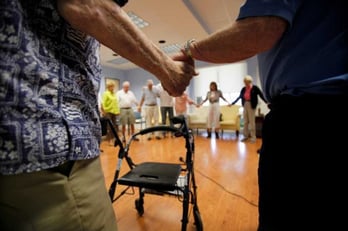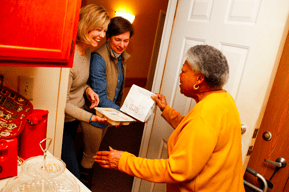People who serve as caregivers for the elderly have a lot to deal with. That’s especially true if they provide full-time care for their loved ones while caring also for children, working and meeting other life responsibilities. They run the risk of burning out and losing themselves.
About one in three family caregivers reported having difficulty finding time to care for themselves, managing emotional and physical stress, and/or maintaining work life balance, according to the National Alliance for Caregiving.
It’s estimated that more than 40 million Americans — about one in 10 — provide care to ill or disabled adults 65 or older.
And that’s a significant concern, because family caregivers are a critical national health care resource.
The burden of providing care weighs heavily on everyday Americans
It’s estimated that more than 40 million Americans — about one in 10 — provide care to ill or disabled adults 65 or older. Their efforts represent hundreds of billions of dollars in unpaid care.
As the Baby Boom generation ages, the amount of unpaid care provided is expected to increase sharply, especially now that results from our recent national elections have made repeal of the Affordable Care Act likely.
National Family Caregivers Month seeks to raise awareness of the significant strains private care providers face, and to provide support to those who might feel overwhelmed. This year’s theme, “Take Care to Give Care,” promotes the age-old wisdom that to take care of another, one must also remember to care for one’s self.
Today, let’s look at three ways you can help relatives or friends who provide care:
1. Encourage caregivers you know to seek out mutual support
 Some of the best help caregivers receive is from other caregivers. And there are groups dedicated to just that.
Some of the best help caregivers receive is from other caregivers. And there are groups dedicated to just that.
Here at Marjorie P. Lee, our Caregiver Support Group meets monthly. All caregivers from the community are welcome to attend, regardless of whether they have loved ones in residential care at our retirement community.
Other support groups exist in the Tristate area. Many are available through Catholic Charities. Some community groups are specifically geared toward caregivers of people with certain conditions, like Alzheimer’s disease and dementia disorders, or cancer.
2. Offer to carry some of the load
Many caregivers are reluctant to reach out when they feel overwhelmed. By volunteering your assistance, you could provide a stressed caregiver with a needed lifeline. There are many things you could do:
• Offer to grocery shop or run errands for the caregiver.
• Babysit a caregiver’s children for a few hours after school, every day or even just a few times a week.
• Bake a casserole and bring it over to give a caregiver the night off from cooking for his or her family.
• Volunteer to shuttle the care recipient back and forth to medical appointments or an adult day program, giving the caregiver needed “alone time.”
• Offer to assume the role of caregiver for a weekend and allow the full-time provider to take a respite break.
• Help subsidize the care. The annual out-of-pocket cost to caregivers providing for someone age 50 or older averaged $5,531 in 2007, according to AARP.
• Serve as a sounding board. Sometimes, caregivers just need a friendly ear to listen to them.
These are just a few ideas. Talk with your family member or friend and find out what the most immediate needs are. Then help them to meet those needs as best you can.
3. Watch out for signs of depression
Depression can be a silent stalker. Some people who suffer from it aren’t even cognizant that they’re displaying symptoms.
 If a caregiver you know is exhibiting unusual mood shifts, seems overly worn out or harried or seems unusually quiet, lend an ear. Tell them what you’ve noticed and encourage them to seek help from a physician and/or a qualified, reputable therapist. If they are reluctant to do so, offer to help them find professional support resources.
If a caregiver you know is exhibiting unusual mood shifts, seems overly worn out or harried or seems unusually quiet, lend an ear. Tell them what you’ve noticed and encourage them to seek help from a physician and/or a qualified, reputable therapist. If they are reluctant to do so, offer to help them find professional support resources.
National Family Caregivers Month is a time to make caregivers more visible
Share this post and help to spread the word. Many Americans aren’t aware of the scope of private care provided to the elderly; as a nation, we need to do a better job shining a light on those who meet our most vulnerable elders’ needs.
If you’re a caregiver in Cincinnati who feels overwhelmed by the burden of providing for an older, ill, or disabled loved one, we’re here to help you through community resources like Deupree Meals on Wheels, care management through Living Well Senior Solutions, or with residential placement.
When you need us, click here. Let’s talk.
Looking ahead: Conference for CaregiversERS's Parish Health Ministry has planned its annual conference to offer resources and support to caregivers who are supporting a loved one living with Alzheimer’s or dementia. An enhanced regional conference for 2017, "Refresh Your Soul - Alzheimer’s & Dementia: Overcoming the Struggles & Living Inspired," has expanded to become a two-day event devoted to dementia care at Xavier University’s Cintas Center. In partnership with ERS, Xavier University will host the second day’s “Dementia Care Summit.” The conference’s title sponsor is TriHealth.
SAVE THE DATE: DAY ONE — PHM REFRESH YOUR SOUL CONFERENCEMonday, March 13, 2017
|













